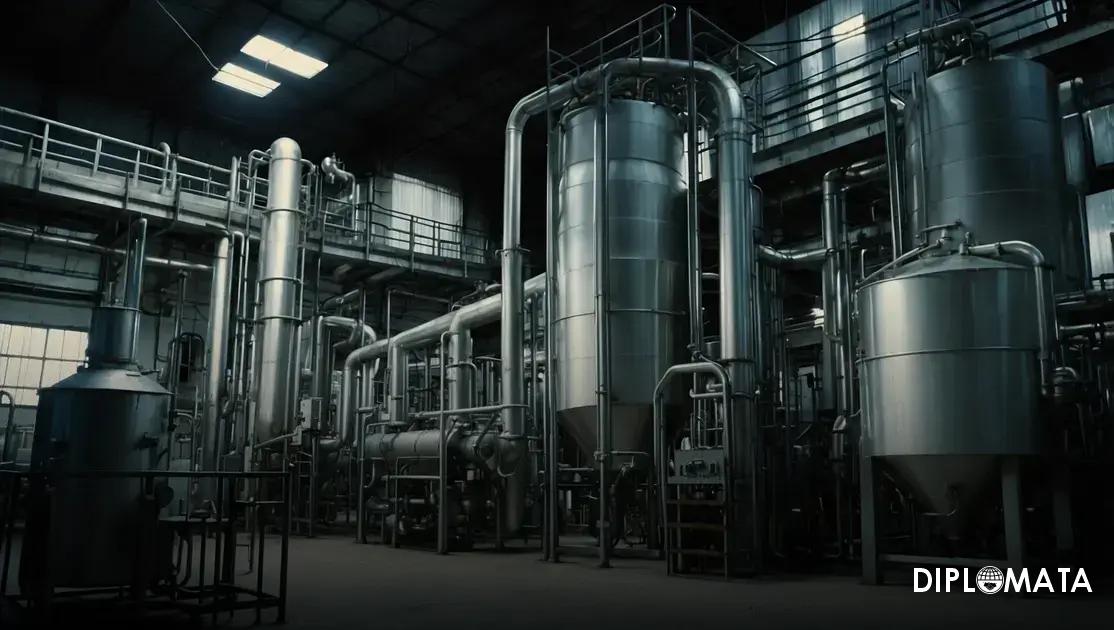What are the key regulations affecting the chemical industry? These regulations encompass a range of laws and guidelines that govern safety, environmental impact, and operational procedures within the chemical sector.
What are the key regulations affecting the chemical industry? Understanding these regulations is crucial for companies and industries seeking AMINAS suppliers. In this post, we will delve into the various legal frameworks that shape the operations of the chemical industry. You will discover the implications of these regulations on safety, compliance, and sustainability practices. By the end of this article, you will be equipped with valuable insights that can help navigate the complex regulatory landscape and make informed decisions for your business. Let’s explore the vital aspects that every industry player should know.

In an era where the chemical industry is under increasing scrutiny, understanding the key regulations affecting this sector is not just a necessity; it’s a strategic advantage. Navigating through the complex regulatory landscape can be daunting, but it is crucial for ensuring compliance, safety, and sustainability. This article will explore the essential regulations that shape the chemical industry, providing you with the insights needed to thrive in this challenging environment.
Understanding the Landscape of Chemical Regulations
The regulatory framework governing the chemical industry is multifaceted, involving various national and international bodies. Key regulatory agencies such as the Environmental Protection Agency (EPA) and the Occupational Safety and Health Administration (OSHA) play pivotal roles in ensuring safety and environmental protection. Major legislation includes the REACH (Registration, Evaluation, Authorisation and Restriction of Chemicals) in Europe, and the TSCA (Toxic Substances Control Act) in the United States, both of which outline the requirements for chemical safety and reporting.
The Importance of Compliance in the Chemical Sector
Compliance with chemical regulations is not merely about adhering to the law; it brings significant benefits to companies in the sector. First, it mitigates risks associated with chemical handling and production, thereby protecting employees and the environment. Second, compliance is essential for gaining access to global markets, particularly in regions with stringent regulatory requirements. Lastly, a strong compliance record enhances corporate reputation, fostering trust among stakeholders and customers.
Key Criteria for Selecting Regulatory Partners
When evaluating potential suppliers and partners, companies should consider several critical factors to ensure regulatory compliance. These include:
- Certification: Verify that suppliers hold relevant certifications that demonstrate compliance with industry standards.
- Experience: Assess the supplier’s track record in the chemical industry, focusing on their ability to meet regulatory requirements.
- Alignment with Industry Standards: Ensure that potential partners align with established best practices and guidelines in chemical handling and safety.
Step-by-Step Guide to Navigating Compliance Processes
To effectively navigate compliance processes, companies should follow a structured approach:
- Identify Applicable Regulations: Determine which regulations apply to your specific chemical products.
- Documentation: Prepare necessary documentation, including safety data sheets (SDS) and compliance reports.
- Reporting Requirements: Familiarize yourself with reporting obligations to regulatory authorities.
- Communication: Establish clear lines of communication with regulatory bodies and stay updated on changes in regulations.
Advanced Strategies for Regulatory Excellence
Industry leaders employ several advanced strategies to maintain compliance with regulations:
- Leverage Technology: Utilize compliance tracking software to monitor regulatory changes and ensure adherence.
- Staff Training Programs: Implement regular training sessions for employees to stay informed on compliance requirements.
- Proactive Engagement: Actively participate in industry forums and workshops to keep abreast of regulatory updates and best practices.
Common Pitfalls in Regulatory Compliance and How to Avoid Them
Companies often encounter pitfalls in regulatory compliance, which can lead to severe repercussions. Common mistakes include:
- Neglecting Documentation: Failing to maintain accurate records can result in non-compliance.
- Ignoring Training: Lack of employee training can lead to unsafe practices.
- Overlooking Updates: Not staying informed about regulatory changes can result in outdated compliance strategies.
To mitigate these risks, establish a culture of compliance within the organization, ensuring that every employee understands the importance of adhering to regulations.
Conclusion
In conclusion, understanding and navigating the key regulations affecting the chemical industry is essential for any organization looking to succeed in this competitive landscape. By prioritizing compliance, selecting the right partners, and implementing robust processes, companies can ensure safer operations and foster trust among stakeholders. Stay informed, stay compliant, and lead your organization toward a sustainable future.
Our Expertise in Chemical Industry Regulations
Our content reflects a deep understanding of the chemical industry, backed by 20 years of experience. As specialists in Aminas manufacturing and distribution, we are recognized as a reputable supplier with impeccable management and structure. This expertise positions us as a trustworthy source on What are the key regulations affecting the chemical industry?
Our Location: Av. Ipanema N° 165 – Empresarial 18 do Forte, Barueri – SP. CEP: 06472-002
Frequently Asked Questions
What is REACH and how does it affect the chemical industry?
REACH, which stands for Registration, Evaluation, Authorisation, and Restriction of Chemicals, is a European Union regulation. It requires manufacturers and importers to register chemical substances and assess their risks. This regulation aims to protect human health and the environment while promoting the competitiveness of the EU chemical industry.
What are the main objectives of the Toxic Substances Control Act (TSCA)?
The Toxic Substances Control Act (TSCA) is a U.S. law aimed at regulating chemical substances to ensure safety for human health and the environment. Its main objectives include evaluating existing chemicals, controlling hazardous substances, and requiring manufacturers to report data on chemical risks and safety.
How does OSHA regulate chemicals in the workplace?
The Occupational Safety and Health Administration (OSHA) regulates chemical exposure in the workplace through the Hazard Communication Standard (HCS). This requires employers to inform workers about chemical hazards, provide safety data sheets, and ensure proper labeling of hazardous substances to ensure a safe working environment.
What role does the Clean Air Act play in the chemical industry?
The Clean Air Act is a U.S. federal law that regulates air emissions from stationary and mobile sources. For the chemical industry, this law sets limits on pollutants and requires companies to implement measures to reduce emissions, thereby protecting air quality and public health.
What is the purpose of the Global Harmonization System (GHS) for chemicals?
The Global Harmonization System (GHS) aims to standardize chemical classification and labeling worldwide. It provides a consistent framework for communicating hazards, ensuring that workers and consumers are informed about the risks associated with chemical substances. This promotes safety and facilitates international trade.





